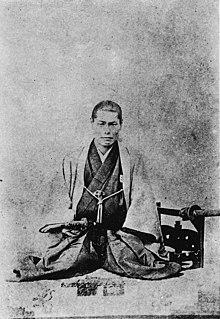Kondo Isami
| Kondō Isami | |
|---|---|

Kondō Isami (1834-1868)
|
|
| Shinsengumi Commander | |
|
In office 1863–1868 |
|
| Preceded by | none (Briefly, office held jointly with Serizawa Kamo and Niimi Nishiki) |
| Personal details | |
| Born | November 9, 1834 Kamiishihara Village, Musashi Province |
| Died | May 17, 1868 (aged 33) Itabashi, Tokyo |
| Nationality | Japanese |
| Spouse(s) | Kondō Otsune |
Kondō Isami ( ?, October 9, 1834 – May 17, 1868) was a Japanese swordsman and official of the late Edo Period, famed for his role as commander of the Shinsengumi.
Isami, who was first known as Katsugorō, was born to Miyagawa Hisajirō, a farmer residing in Kami-Ishihara village in Musashi Province, now in the city of Chōfu in Western Tokyo. He had two older brothers, Otojirō (音次郎; later known as Otogorō 音五郎) and Kumezō (粂蔵; later known as Sōbei 惣兵衛). Katsugorō began training at the Shieikan (the main dojo of the Tennen Rishin-ryū) in 1848.
As a young man he was said to be an avid reader, and especially liked the stories of the Forty-seven Ronin and the Romance of the Three Kingdoms. His renown as a scholar and his fame at having defeated a group of thieves who tried to break into his family home was great, and caught the attention of Kondō Shūsuke, the third generation master of the Tennen Rishin-ryū. Shūsuke wasted no time in adopting the young Katsugorō in 1849, who first took the name of Shimazaki Katsuta (島崎勝太). According to a record in the possession of the former Gozu-tennōsha Shrine 牛頭天王社 (now the Hino Yasaka-jinja Shrine 日野八坂神社), Katsuta is listed, with full common name and formal name, as Shimazaki Isami Fujiwara (no) Yoshitake (島崎勇藤原義武), and thus, had the name Isami (勇) as of 1858, the document's date.
Kondō is said to have owned a katana called "Kotetsu" (), the work of the 17th century swordsmith Nagasone Kotetsu. However, the authenticity of his "Kotetsu" is highly debatable. According to Yasu Kizu's pamphlet on the swordmaker Kotetsu, Kondō's sword may actually have been made by Minamoto no Kiyomaro, a swordmaker of high repute roughly contemporary to Kondō.
...
Wikipedia
